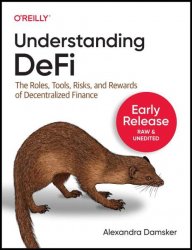Understanding DeFi (Early Release)
- Добавил: literator
- Дата: 29-09-2023, 07:55
- Комментариев: 0
 Название: Understanding DeFi: The Roles, Tools, Risks, and Rewards of Decentralized Finance (Early Release)
Название: Understanding DeFi: The Roles, Tools, Risks, and Rewards of Decentralized Finance (Early Release)Автор: Alexandra Damsker
Издательство: O’Reilly Media, Inc.
Год: 2023-09-28
Язык: английский
Формат: pdf, mobi, epub
Размер: 10.2 MB
Decentralized finance (DeFi) is a rapidly growing field in fintech, having grown from $700 million to $100 billion over the past three years alone. But the lack of reliable information makes this area both risky and murky. In this practical book, experienced securities attorney Alexandra Damsker explains DeFi's role in both blockchain and finance.
Ideal for developers looking to build decentralized applications (DApps), this book compares DeFi to traditional bank-led fintech and explains why DeFi is exploding in interest and popularity. You'll explore the growing array of DApps and platforms in various categories, including their benefits and drawbacks, and learn how DeFi tools work together from the perspective of both users and developers.
An application is a software system created to perform a particular task, or to enable a user to perform a specific function. It runs on a particular type of platform, and is the main point of interaction for users. Decentralized applications (“DApps”) are very similar to traditional applications. They run on a platform operating system. However, instead of being run on a centralized server, they run on a blockchain platform. As discussed in chapter one, these are distributed, decentralized platforms are a direct, peer-to-peer network that conducts direct transfer of assets between wallets instead of running through a controlled intermediary like a server. The following are the four main elements of a true DApp. However, this is a non-exhaustive list of DApp requirements, just to give you an idea of what is needed.
The blockchain should be able to maintain its integrity against hacks and malicious attacks. This is actually one of the most interesting aspects of blockchain, in that blockchain developers don’t assume hackers are strictly outside bad actors. They assume some of the nodes and/or users are bad actors and develop the system to withstand both internal and external malicious action. Personally, I find this fascinating, because it acknowledges a simple truth about human nature: bad actors are everywhere, and they don’t always conveniently announce themselves as masked robbers with guns blazing, shooting their way into secured areas. They are quite often internal actors, or ones who exploit weaknesses that aren’t known or addressed. This is one of the first problems addressed, in fact, with a principle called Byzantine Fault Tolerance. The problem really lies in the fact that security and scalability are inversely related.
With this book, you will:
Learn how DeFi fits into the blockchain and fintech worlds
Understand why it's important to move beyond the banking system
Explore the tools for building a useful, functional DeFi application
Learn the risks, benefits, regulatory concerns, and unresolved issues in this nascent and fast-growing industry
See which technologies are well-positioned to be incorporated into DeFi blockchains in the near future
Assess your own risk level to determine which strategies are most appropriate
Скачать Understanding DeFi (Early Release)
Внимание
Уважаемый посетитель, Вы зашли на сайт как незарегистрированный пользователь.
Мы рекомендуем Вам зарегистрироваться либо войти на сайт под своим именем.
Уважаемый посетитель, Вы зашли на сайт как незарегистрированный пользователь.
Мы рекомендуем Вам зарегистрироваться либо войти на сайт под своим именем.
Информация
Посетители, находящиеся в группе Гости, не могут оставлять комментарии к данной публикации.
Посетители, находящиеся в группе Гости, не могут оставлять комментарии к данной публикации.
